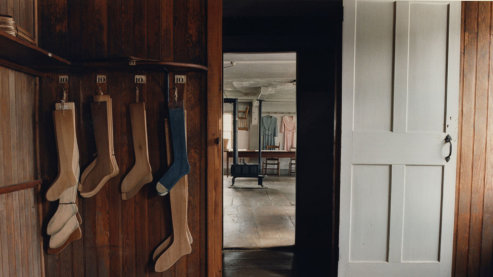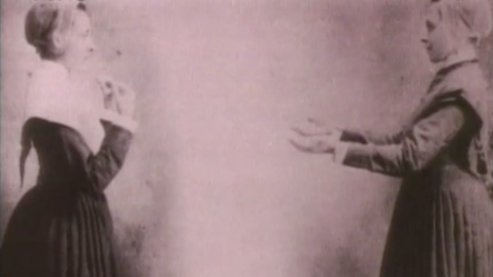About the Shakers

Zaddock Wright lived in Canterbury, New Hampshire, at the start of the Revolutionary War. Unlike his neighbors, he was a royalist and refused to take up arms against the king. According to an early chronicle he fled to Canada “to avoid the dangers to which his political principles exposed him” but was arrested when he returned for his family and thrown into prison in Albany.
Before his incarceration Zaddock Wright had been deeply affected by the religious revival that, like the Revolution, was sweeping across New England. He was “under great exercise of mind concerning the work of God,” and was also “in great tribulation” over his family, his estate, and the Revolution.
At the same time, several cells away, a woman named Ann Lee was being held, accused of treason against the new government. Zaddock knew of her; she was a prophet, the English leader of a tiny radical sect of Christians called the Shakers. Her small group had recently “opened the testimony” on the frontier near Albany and ignited a wildfire of disruption and religious fervor.
Zaddock spoke with Mother Ann, as her followers called her, through the grates of his cell, and informed her of his “embarrassments.” “You will be delivered,” she told him. “Gold will deliver you.” Although this seemed unlikely to Zaddock, the declaration “made a forcible impression upon his feelings.” They spoke at length about the Revolution. Ann Lee taught him to “view the subject from a different light than what he had done, and convinced him that it was the providential work of God to open the way for the Gospel.” Zaddock agreed that it would be impossible for England to win. “The hand of God was in the Revolution,” he wrote, “and America must be separated from the English government and become a land of liberty for the gospel’s sake.”
Within a year, Zaddock was freed from the prison and returned to his family, as Ann Lee predicted. He joined the Shakers and “continued faithfully to the end of his days.”
One afternoon I was at a neighbor’s house when two young women attired in Shaker costumes appeared at the rear door. They said the Shakers always lived according to their profession, were honest and upright, but that they did not wish to live a celibate life any longer. A strange sensation seemed to creep over me, and something like a voice said, “Why listen to them? Go to the Shakers. See for yourself who and what they are.”
-- Eldress Antoinette Doolittle, 1824
They called themselves the United Society of Believers in Christ’s Second Appearing, but because of their ecstatic dancing the world called them the Shakers.
The Shakers were celibate, they did not marry or bear children, yet theirs is the most enduring religious experiment in American history. Seventy-five years before the emancipation of the slaves and one hundred fifty years before women began voting in America, the Shakers were practicing social, sexual, economic, and spiritual equality for all members.
The Shakers were ordinary people who chose to give up their families, property, and worldly ties in order “to know, by daily experience, the peaceable nature of Christ’s kingdom.” In return, they were welcomed into “holy families” where men and women lived as brother and sister, where all property was held in common, and where each participated in the rigorous daily task of transforming the earth into heaven.
Shakerism was founded by an illiterate English factory worker named Ann Lee. Guided by divine visions and signs, she and eight pilgrims came to America in 1774 to spread her gospel in the New World.
At their height in 1840 more than six thousand believers lived in nineteen communal villages from New England to Ohio and Kentucky. Tales of their peaceful and prosperous lives impressed the world’s utopians. But Shaker aspirations were divine, not social or material. As millennialists, they were unified in the belief that Christ had come again, first in the person of Mother Ann and subsequently “in all in whom the Christ consciousness awakens.” It was therefore the duty of each believer to live purely in “the kingdom come” and to strive for perfection in everything he or she did.
Work was the currency of their service. If the world was to be redeemed and restored to God, the Shakers would accomplish it by the dedicated labor of their hands. They believed that God dwelt in the details of their work and in the quality of their craftsmanship. All their devotion, which no longer went to family or home, was put into what they made. Their villages were meticulously constructed and maintained, their workshops were world renowned for reliable goods, and their gardens provided amply for their own needs, with plenty to spare for the poor.
Shakerism is a system which has a distinct genius, a strong organization, a perfect life of its own, through which it would appear to be helping to shape and guide, in no small measure, the spiritual career of the United States.
-- Hepworth Dixon, 1867
For more than two hundred years Shakerism ran alongside American history, sometimes heralding things to come, usually reflecting trends, events, and ideals from a slightly different angle. The Shakers arrived in America on the eve of the Revolution, having left England in pursuit of freedom. They were gathered into order as a practicing religion in 1787, just as the new United States found its form with the drafting of the Constitution. That same year Shaker women were officially given equal rights, and in 1817 the Shakers’ southern societies freed the slaves belonging to members and began buying black believers out of slavery. The Shakers were suddenly appreciated as successful communitarians when Americans became interested in communities, as successful utopians when America hosted a hundred utopian experiments, as spiritualists when American parlors filled with mediums and with voices from other worlds. They invented hundreds of laborsaving devices from the clothespin to the circular saw, which they shared without patents (some of these machines launched brilliant industrial careers for the men who borrowed them), nor were they frightened of useful inventions. The New Hampshire Shakers owned one of the first cars in the state and rigged up electricity in the own village while the state capital building was still burning gas. They were admired and derided, imitated for their successes and ridiculed for their eccentricities. And they are enduringly appreciated for their contribution to American crafts and architecture.
Today, just a few Shakers still live in a single village in Maine. To all appearances these are the last Shakers. But the living Shakers faithfully assert that their religion will never die. Mother Ann predicted that Shakerism would dwindle to as few members as a child could count on one hand, and then overcome all nations. “This is God’s work,” says Sister Mildred Barker, “and what could bring that to an end? Nothing that we humans, that mortals do.”


